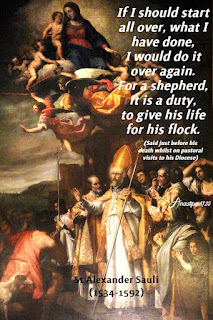Feast Day: September 20
 |
| Image from https://www.catholic.org/saints/saint.php?saint_id=20 |
Saint Andrew Kim Taegon, also known as Saint Andrew Kim, was a Korean Catholic priest and a martyr. He was born on August 21, 1821, in the Korean kingdom of Joseon. Andrew Kim was the first Korean-born Catholic priest and is considered a significant figure in the history of Christianity in Korea.
Biography:
Andrew Kim was born into a noble family that had converted to Catholicism, a religion that faced persecution in Korea during that time. Despite the risks, Andrew Kim was baptized at the age of 15. He traveled to China to study for the priesthood due to the lack of seminaries in Korea. He was ordained a priest in Shanghai, China, in 1845.
After his ordination, Father Andrew Kim returned to Korea to minister to the small Christian community there, despite the severe persecution faced by Catholics in the country. In 1846, he was arrested by Korean authorities, who viewed Christianity as a threat to their power. He was subjected to severe torture but remained steadfast in his faith.
On September 16, 1846, at the age of 25, Andrew Kim was martyred, along with several other Catholics, in a mass execution. His death, along with the deaths of many other Korean Catholics during this period, inspired even more fervent devotion to Christianity in Korea. He was beatified on September 11, 1925 by Pope Pius XI and canonized on 6 May 1984 by Pope John Paul II
Patronage:
Saint Andrew Kim Taegon is recognized as the patron saint of Korean clergy and the Korean Catholic Church. He is also revered as a symbol of courage and faithfulness in the face of persecution.
Prayer to St. Andrew Kim Taegon:
"O God, You have called Andrew Kim Taegon and his companions to share in the martyrdom of Christ. Through their faithfulness You have built up Your Church. Grant that, through their intercession, the Christian faith may continue to grow throughout the world. We make this prayer through our Lord Jesus Christ, Your Son, who lives and reigns with You in the unity of the Holy Spirit, one God, for ever and ever. Amen."
Reflection:
The life and martyrdom of Saint Andrew Kim Taegon serve as a powerful reminder of the sacrifices made by early Christians to uphold their faith. Despite facing persecution and death, Andrew Kim remained steadfast in his commitment to Christ and His Church. His courage and devotion continue to inspire Christians around the world, especially those who face persecution for their beliefs. Saint Andrew Kim Taegon's story encourages us to remain faithful in the face of adversity and to trust in God's providence, knowing that He is with us always, even in our darkest moments.










